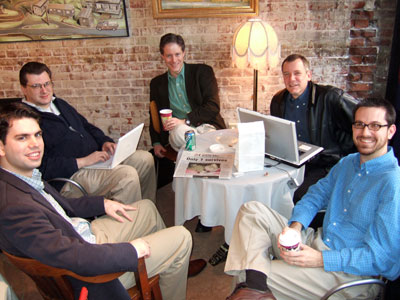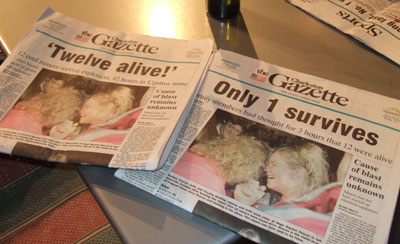I missed tonight's live state of the state address because I was busy putting kids to sleep -- but thanks to technology you can check out the
video replay or read the
full text version on the
Governor's Office website. There are also copies of the 2007
budget overview in powerpoint and pdf.
Governor Manchin's address paid tribute to the miners lost at the Sago Mine and recognized the loss experienced by most West Virginians over the last couple of weeks. Following is a text except from his speech: topic:
It has been a difficult week in our state. Just seven short days ago, we lost 12 hardworking and brave West Virginians; men who left their homes each day knowing the inherent difficulty and danger of the jobs they performed and men who were proud to provide for their families, proud to be a West Virginian and proud of the energy they produced to keep America strong. We cannot know the purpose of this tragedy - but I assure you we will discover the cause. I am committing every resource available to me to aid in the investigation - not only to determine what happened inside the Sago Mine that caused this terrible accident, but also how the information received outside of the mine regarding the condition of the miners could have been so horribly wrong. Families should never be put through such a heartbreaking, emotional nightmare. Even more important, I rededicate myself and the State to the task of making our mines the safest in the country so that we can avoid future tragedies like the one we have just experienced.
Our prayers as a state are with the families of Thomas P. Anderson, Alva Martin Bennett, James Bennett, Jerry Groves, George Junior Hamner, Terry Helms, Jesse L. Jones, David Lewis, Martin Toler Jr., Fred Ware Jr., Jackie Weaver and Marshall Winans. During the coming days, we will continue as West Virginians to do what we do best - come together in support of our neighbors. We did this when the disaster of Hurricane Katrina hit the people living in the southern states of America, and we do it again now for our own. I want to thank the thousands of West Virginians who have donated goods, as well as their hard-earned money, to the miners' families over the last several days. Words cannot express to you how proud I am to be Governor of a State that is home to such amazing people. I also want the miners' families to know that the support that we offer will be ongoing. And so, my office is joining with the West Virginia Council of Churches to establish a "Lifeskills Account" for the immediate family members of the victims. To demonstrate the importance of this effort, my office will be contributing $100,000 from the Governor's Contingency Fund to this account. These men were working hard to provide a good living for their loved ones, and we must continue their efforts.
The money donated to this account will provide for traditional educational opportunities plus any trade or technical field training that they may wish to obtain in order to expand their knowledge and gain the skills needed to support themselves and their families, no matter what their age. We want them to know that we will be in this with them through their long journey. I would like to now thank the Reverend Dennis Sparks with the West Virginia Council of Churches for agreeing to administer this very special account on our behalf. Reverend Sparks, please stand and be recognized.
Many times during the rescue efforts you heard me say that West Virginians believe in miracles - and we do. While we didn't receive the 13 miracles we were praying for, we did receive one - Randal McCloy Jr. It is my hope that he can one day tell us his miracle story and the stories of his friends and co-workers. So let us also remember his struggles tonight and send him, his wife Anna, their two children, Randal III and Isabelle Hope, and their entire family our prayers and love as well.
During our time of crisis, the nation has been watching. They have learned a great deal about West Virginia values and our belief in family, faith in God and the love of our neighbor. In addition, they've learned a great deal about mining families and their strength, work ethic and sense of community - there are no better people on the face of this earth.
Governor Manchin's address focused on a number of health care related issues including the announcement of proposed legislation for a statewide Health Information Network coordinated with
HEALTHeWV. Following is a text except on this topic:
And, as a follow up to an initiative that was started during last year's State of the State address, we will form, through legislation, a statewide Health Information Network. With this network, West Virginia will become a national leader in the conversion to electronic health records - which it is predicted will result in an increase in healthcare quality and the type of dramatic cost savings that can significantly impact the state's budget. In addition, as part of this overall electronic medical records initiative, the state will also coordinate with HEALTHeWV, an electronic medical records program supported by Senator Robert C. Byrd and managed by the National Technology Transfer Center at Wheeling Jesuit University.
As previously announced by the Governor he also mentioned his desire for a more streamlined and practical medical billing system in West Virginia.
I am also committed to working with hospitals and providers on achieving some form of an integrated medical billing system in West Virginia. It makes no sense to me that when you have a medical procedure performed at a hospital or clinic, they can't tell you upfront what it's going to cost. Then after the procedure is performed, you don't receive a complete bill and, if you're like me, you have no idea what the total cost was. This is the only service that I know of in America that operates under these billing procedures. Now is the time for us to change this process.


